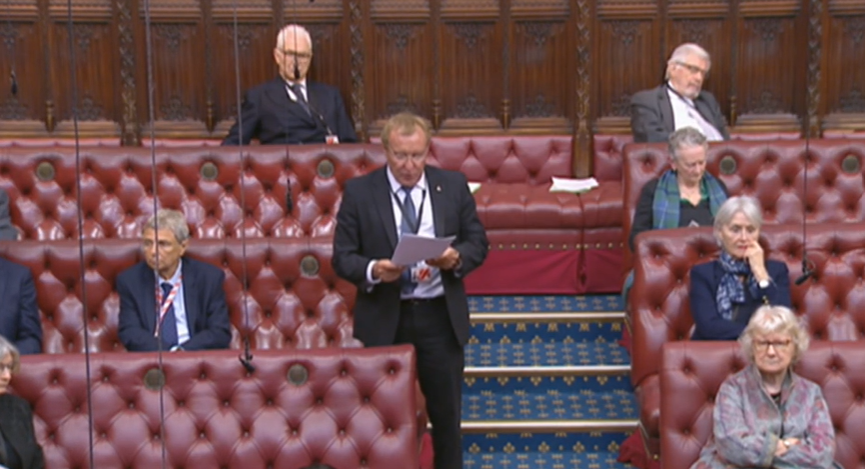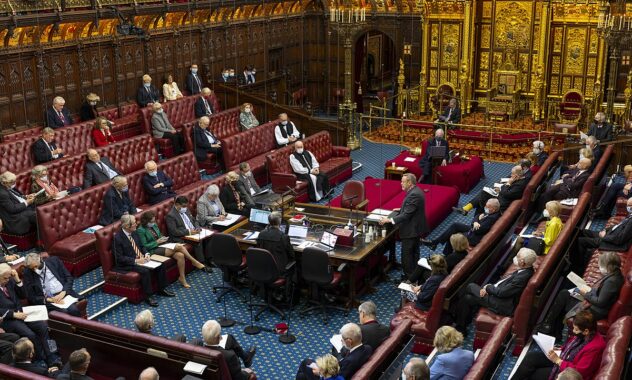Government defeated in the Lords over Minimum Service Levels Bill amendments
Strikes (Minimum Service Levels) legislation sigificantly amended in report stage in the House of Lords

The Government suffered a series of defeats yesterday in the Lords over their controvresial Strikes Bill. Opposition Peers won the votes on four amendments to the legislation, which would significantly alter the impact of the Bill. In what were narrow votes, the Government were defeated on amendments covering consultation on the proposed changes on the right to strike; failure to comply with a work notice being regarded as a breach of contract; the threat of injunctions and fines for trade unions and exemptions for Scotland and Wales.
Members of the Lords began further examination of the Strikes (Minimum Service Levels) Bill in report stage yetersday, the Wednesday 26 April. Peers speaking at report stage were able to put forward amendments to the bill to be discussed. The amendments discussed in the Lords Chamber yesterday covered a range of subjects, including work notices, the protection of trade union members and legislative scope.
Lords Debate:
In presenting the first amendement, on the requirement to consult over the proposed changes, Lord Fox said:
“This amendment seeks to bolster Parliament’s oversight. It would require a consultation to be carried out and reviewed before the powers in new Section 234B for the Secretary of State to specify minimum service levels can be used.”
The amendment was passed with a majority of 24.
In moving Amendment 4, on breach of contract, former TUC General Secretary Baroness Frances O’Grady said:
“Employees are currently protected against unfair dismissal for the first 12 weeks of a lawful strike. In Committee, there were strong concerns around the Committee that this Bill, as currently drafted, unilaterally removes that protection from individual key workers named in a work notice who do not comply, and that this is not compatible with the UK’s obligations on human and labour rights. No other European country with minimum service levels gives employers the power to take away the livelihoods of workers in these circumstances —not one. This would make Britain an outlier in Europe and would constitute a gross infringement of an employee’s individual freedom.”
In moving amendment 5, on the issue of injuctions and damages, Lord Collins of Highbury said:
“What is the definition of “reasonable steps”? What situation are we putting trade unions in with this vague requirement that could result in them facing legal action? If a union is deemed not to have followed the legislation, the strike could be regarded as unlawful and the protection for striking workers, such as automatic unfair dismissal protection, could be removed from all striking members, including those not named in the work notices. So, employees will not know before participating in the strike action whether they have protection, and unions do not know what amounts to “reasonable steps”, as no detail has been provided in the Bill. I think that is an unacceptable situation. We should not be passing laws that put individuals and trade unions in that position.”
Speaking in support of amendment 5, Lord Hendy added:
“The purpose of the proposed new Section 234E is objectionable, for all the reasons my noble friend Lord Collins has spelled out: the ethical objection to requiring a union to undermine its own otherwise lawful strike. There is a more fundamental point here; this is an elephant trap. The purpose of this provision is to enable employers to get injunctions to prevent unions conducting a strike that has been balloted.”
Amendment 4 was agreed by a majority of 31 votes and Amendment 5 was agreed by 24 votes.
Lastly, an amendement proposing to exempt the Senedd (Wales) and the Scottish Parliament from the Bill in its entirety. In moving the motion, Lord Thomas of Cwmgiedd, said:
“The UK Government, which are under the law responsible only for health, ambulances and education in England, should not be interfering in areas for which they have no responsibility in Scotland and Wales. It is impractical, wrong in principle and makes no sense. The real problem is that this is yet another attempt to undermine devolution and give strength to those who wish to see the union weakened.”
Amendment 7 was agreed by a majority of 29 votes. The full Hansard transcript of the debate can be read here.
The legislation will now move on to it’s third reading in the House of Lords (scheduled for the 9th of May 2023) and then will pass back to the House of Commons for the final stages of the Bill, ending in the Royal Assent, should the Bill be approved.
While the amendments passed last night are significant, it’s important to understand that the Commons is able to reject these amendments, should it choose to, in the final stages of the Bill’s passage. With the Government commanding a significant majority in the House of Commons, some commentators feel it is likely that the amendments will be rejected and the legislation will be passed.
Amendments to the Strikes (Minimum Service Levels) Bill passed by the Lords yesterday:
1. Amendment 1 – Lord Fox:
(5) The powers conferred by this section must not be exercised unless a consultation on the potential impact of their use has been carried out, published, and reviewed by a committee of each House of Parliament whose remit includes either the wider UK workforce and industrial relations, or the sector to which the regulations in question relate.(6) Such consultations must—(a) be carried out by the Secretary of State and involve representatives of any relevant unions, employers and other interested parties,(b) include an assessment of the potential impact of the minimum service regulations on the rights of workers to strike, the effectiveness of the relevant services, and the impact on the wider public,(c) consider services in all categories listed in subsection (4), and(d) include reference to respective service levels outside of strike action.(7) The results of the consultation and the reviews by committees must be published in a report, and the Secretary of State must lay a copy of the report before Parliament.
Passed 221 votes to 197.
2. Amendment 2 – Lord Callanan (Government)
(a) whether the person is or is not a member of a trade union,(b) whether the person has or has not—(i) taken part in the activities of a trade union, or(ii) made use of services made available to the person by a trade union by virtue of the person’s membership of the union, or(c) whether or not—(i) a matter has been raised on the person’s behalf (with or without the person’s consent), or(ii) the person has consented to the raising of a matter on the person’s behalf,by a trade union of which the person is a member.(6A) In subsection (6) “a trade union” includes—(a) a particular trade union, and(b) a particular branch or section of a particular trade union.”
Agreed (no vote taken)
3. Amendment 4 – Baroness O’Grady
234CA Protection of employees (1) A person is not subject to a work notice if the person in question has not received a copy of the work notice.(2) It is for the employer to prove that an individual received a work notice.(3) Failure to comply with a work notice is not to—(a) be regarded as a breach of the contract of employment of any person identified in the work notice, or(b) constitute lawful grounds for dismissal or any other detriment.(4) Having regard to subsection (3), failure to comply with a work notice is deemed to be—(a) a trade union activity undertaken at an appropriate time for the purposes of sections 146 (detriment on grounds related to union membership or activities) and 152 (dismissal of employee on grounds related to union membership or activities), and(b) participation in industrial action for the purposes of sections 238 (dismissals in connection with other industrial action) and 238A (participation in official industrial action).
Passed 232 votes to 201
4. Amendment 5 – Lord Collins
The Schedule, page 5, leave out lines 9 to 22 (the section that removes protection from unions)
Passed 220 votes to 196
5. Amendment 7 – Lord Thomas
Clause 4, page 2, line 13, at end insert “but applies only to England”
Member’s explanatory statement
This amendment would limit the application of this Act to England.
Passed 213 votes to 184
Resources:
A full list of amendments can be found here.
The current version of the Strikes (Minimum Service Levels) Bill can be found here.
You can read the House of Lords briefing on the Bill here.







